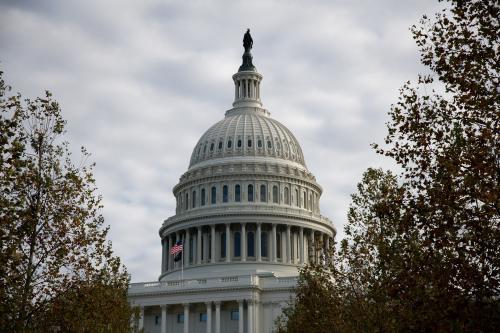If the American people and Congress are looking to the Federal Trade Commission (FTC) for leadership in the protection of personal privacy, they should prepare for disappointment. In a recent filing with the Commerce Department’s National Telecommunications and Information Administration, the FTC walked away from giving consumers meaningful control of their private information. The bromides they espoused sound remarkably similar to the arguments of the companies that routinely exploit our privacy.
In the section of the filing that focuses on consumer control of their private information, the FTC followed the typical Trump Administration tactic of sounding like it stands for something before ultimately standing down. “Giving consumers the ability to exercise meaningful control over the collection and use of data about them is beneficial,” the filing states before ending the sentence with the gutting qualifier, “in some cases.” The agency that so many in Congress look to as the institution to protect consumer privacy then warned, “certain controls can be costly to implement and may have unintended consequences.”
This waffling was just the warm-up to the following exercise in political spin: “if consumers were opted out of online advertisements by default (with the choice of opting in), the likely result would include the loss of advertising-funded online content.” What an amazing transmogrification of “opt-in” privacy protections to become an “opt-out” of advertising! The fundamental concept that the consumer should have the right to opt-in control of information collected about them magically transformed into opting out of advertisements.
The FTC is wrong because when a consumer chooses what information to provide, it does not mean they are choosing to opt out of advertising. It only means that each consumer is exercising their individual agency to decide what information is collected about them for the targeting of advertisements.
The FTC is further wrong because a consumer making a choice about what information to disclose does not mean there will not be information for the platform companies to use. It only means that the consumer has asserted ownership over his or her digital information. The platform companies will still have ample information to use to sell targeted advertising and messaging.
Ninety-two percent of Americans believe companies should have to get permission before sharing their online data. Limiting consumers to opting out only after the data collection has begun—as the FTC advocates—merely shifts the burden to the consumer to attempt to recover their privacy. Looking at existing opt-out policies discloses they typically exist in name only—for instance, to opt out successfully, the consumer has to contact each of the companies to whom the collecting company makes their private information available.
The arguments of the FTC suspiciously echo the advocacy of the companies that today have virtually unimpeded access to all our personal information. After the Obama Federal Communications Commission adopted opt-in privacy rules for network providers (that paralleled the rules that existed for telephone companies), a coalition of networks and the platform service companies that use the networks successfully urged the Republican-led Congress to repeal the Open Internet Order. They argued in a letter to Congress that such rules would, “interfere with the ability of consumers to receive customized services and capabilities.”
It sounds like the FTC just parroted the industry’s argument that somehow protecting a consumer’s privacy means interfering with their access to online products. Sure, the online companies base the advertisement placements they sell on the information they have on each of us. But an opt-in choice for consumers does not mean there will be no information; it simply means that the consumer will determine what that information will be.
The Trump Administration is pretending to be concerned about personal privacy by using the time-honored delaying technique of ordering a study. It’s not as if the evidence doesn’t already abound. Every day, we see another example of privacy invasion from those whose business model depends on siphoning our personal information to resell it for targeted advertising and other messages.
Facebook gave access to the personal data of 87 million Americans (without their knowledge) to Cambridge Analytica. Those Americans did not benefit from the “customized services” the industry and FTC like to talk about. Denied any opt-in authority as to what information could be collected and who could use it, these Americans were exploited for the benefit of Facebook’s revenue, Cambridge Analytica’s manipulation, and the Russian government’s propaganda.
It is concerning that the FTC—the agency so many have looked to as a potential protector of online privacy—has shown that when given a choice between protecting companies or protecting consumers, they accept the companies’ spin and walk away from Americans’ concerns about their personal privacy.
Facebook is a donor to the Brookings Institution. The findings, interpretations, and conclusions posted in this piece are solely those of the author and not influenced by any donation.







Commentary
The Federal Trade Commission will safeguard privacy in name only
November 28, 2018